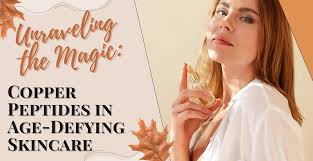
What Are the Benefits of Copper Peptides for Skin?
Copper peptides have been gaining attention in the skincare world, and for good reason. While they are not a new ingredient, copper peptides are powerful skincare agents with remarkable benefits that make them a great addition to your routine. From reducing the appearance of wrinkles to promoting collagen production, copper peptides are versatile and effective in delivering anti-aging and overall skin-improving results.
Whether you’re new to copper peptides or simply curious about why they’ve gained so much buzz, here’s an in-depth look at why they deserve a place in your skincare regimen.
What Are Copper Peptides?
Copper peptides are small molecules composed of copper ions and peptides (short chains of amino acids) that are naturally found in the skin. They are vital for skin health, aiding in a variety of functions including collagen and elastin production, tissue repair, and maintaining skin elasticity. These peptides signal to the skin cells, encouraging them to produce more collagen and promote wound healing, which helps to reduce the visible effects of aging, like wrinkles and sagging skin.
Key Benefits of Copper Peptides for Skin
Copper peptides are power-packed ingredients that work on multiple layers of the skin, delivering a wide range of benefits:
1. Reduces Wrinkles, Fine Lines, and Crow’s Feet
One of the most notable benefits of copper peptides is their ability to reduce visible signs of aging, such as fine lines, wrinkles, and crow’s feet. Copper peptides stimulate collagen production, which is essential for skin’s firmness and elasticity. By boosting collagen and elastin levels in the skin, they help reduce the appearance of fine lines and wrinkles, leading to smoother, firmer skin.
2. Tightens Skin and Improves Elasticity
Copper peptides help tighten the skin by promoting collagen synthesis. As you age, your skin’s natural collagen production decreases, resulting in sagging skin and a loss of firmness. Copper peptides intervene by signaling skin cells to produce more collagen, thereby improving the skin’s overall tone and texture.
3. Lightens Hyperpigmentation and Dark Spots
Copper peptides also help to lighten hyperpigmentation and dark spots by promoting skin cell turnover and regeneration. By encouraging the formation of new, healthy skin cells, copper peptides can help even out your skin tone, leaving your complexion looking brighter and more uniform.
4. Provides Antioxidant Protection
Copper peptides have antioxidant properties that protect the skin from oxidative stress and environmental damage. They help defend against free radicals—unstable molecules that can damage skin cells and accelerate the aging process. This protective action helps to safeguard the skin’s surface, keeping it healthier and more resilient.
5. Promotes Hair Growth and Overall Hair Health
Copper peptides aren’t just beneficial for the skin—they also play a role in supporting hair health. By stimulating hair follicles and promoting circulation, copper peptides may help improve hair density and encourage hair growth, making them a great addition to hair care products as well.
6. Anti-Inflammatory Properties
Copper peptides have anti-inflammatory properties that can help soothe irritation, redness, and skin inflammation. This makes them particularly helpful for sensitive skin, and they can contribute to calming conditions like rosacea and acne.
How Often Should You Use Copper Peptides?
Copper peptides are gentle and can be used daily, even twice a day (morning and night), if your skin tolerates them. Their quick absorption into the skin makes them a versatile ingredient that fits well into both AM and PM routines. You’ll often find copper peptides in serums, balms, moisturizers, and even sunscreens, so they can easily be integrated into your regular skincare lineup.
However, if your skin is sensitive or tends to be dry, it’s important to monitor how your skin reacts, as copper peptides are absorbed quickly, and some people may experience dryness or irritation with overuse. If you’re new to using copper peptides, it’s a good idea to start slowly and observe how your skin responds.
Can Copper Peptides Be Used Under the Eyes?
Yes, copper peptides can be used around the delicate eye area! In fact, this area, being thinner and more prone to wrinkles and sagging, is where copper peptides can be particularly beneficial. They help boost collagen production, improve skin elasticity, and reduce the appearance of fine lines and puffiness around the eyes.
That said, it’s important to choose a formula that’s specifically designed for the eye area to ensure it’s gentle enough for this sensitive skin. Apply copper peptide-based products carefully, making sure to avoid getting them too close to the lash line.
Can Copper Peptides Cause Wrinkles?
No, in fact, copper peptides do the opposite. They help prevent wrinkles and improve skin texture. As we age, collagen production naturally slows down, leading to wrinkles and sagging skin. Copper peptides counteract this process by promoting collagen and elastin production, which in turn helps firm up the skin and smooth out fine lines and wrinkles. With regular use, you’ll likely notice a visible improvement in the look and feel of your skin, with firmer, more youthful-looking skin.
What Should Copper Peptides Not Be Used With?
Copper peptides are generally well-tolerated by most skin types and can work well with a variety of other ingredients. However, there are a few combinations that may lead to irritation or reduced effectiveness:
Vitamin C (Ascorbic Acid): While both ingredients are highly beneficial for skin, combining them may cause irritation or neutralize their effectiveness. Vitamin C is highly acidic, and its potent formulation can interfere with the peptide’s absorption and efficacy. It’s a good idea to use these two ingredients at different times of the day (Vitamin C in the morning, copper peptides at night).
Retinoids (Retinol, Retinoic Acid): Both copper peptides and retinoids work to promote collagen production, but they may be too intense when combined, potentially leading to irritation. Again, alternating their use (retinoids at night and copper peptides in the morning) can help minimize this risk.
AHAs/BHAs (Exfoliating Acids): Since AHAs and BHAs exfoliate the skin and copper peptides work by signaling skin regeneration, combining the two may cause irritation. It’s best to space them out, using AHAs and BHAs on days when you’re not applying copper peptides.
Can Copper Peptides Be Used with Other Skincare Ingredients?
Copper peptides work synergistically with many other skincare ingredients, making them easy to incorporate into your routine. Some ingredients that pair well with copper peptides include:
Hyaluronic Acid: Known for its hydrating properties, hyaluronic acid works well with copper peptides to keep skin plump and moisturized.
Peptides (other types): Different peptides can enhance the efficacy of copper peptides, supporting overall skin health and rejuvenation.
Antioxidants: Vitamin E, green tea extract, and other antioxidants can complement copper peptides by offering additional protection against free radical damage.
Niacinamide: Known for its ability to even out skin tone and reduce inflammation, niacinamide pairs well with copper peptides to enhance the skin’s overall appearance.
Final Thoughts
Copper peptides are an impressive skincare ingredient with a range of benefits—from boosting collagen production and reducing wrinkles to improving skin tone and texture. Because of their versatility and compatibility with other skincare ingredients, they’re easy to incorporate into your routine and can deliver noticeable improvements in skin health over time.
If you’re looking for a powerhouse ingredient that works to rejuvenate your skin and fight the signs of aging, copper peptides are definitely worth considering. Just remember to patch-test new products and start slowly to ensure your skin adapts well to this potent ingredient.


